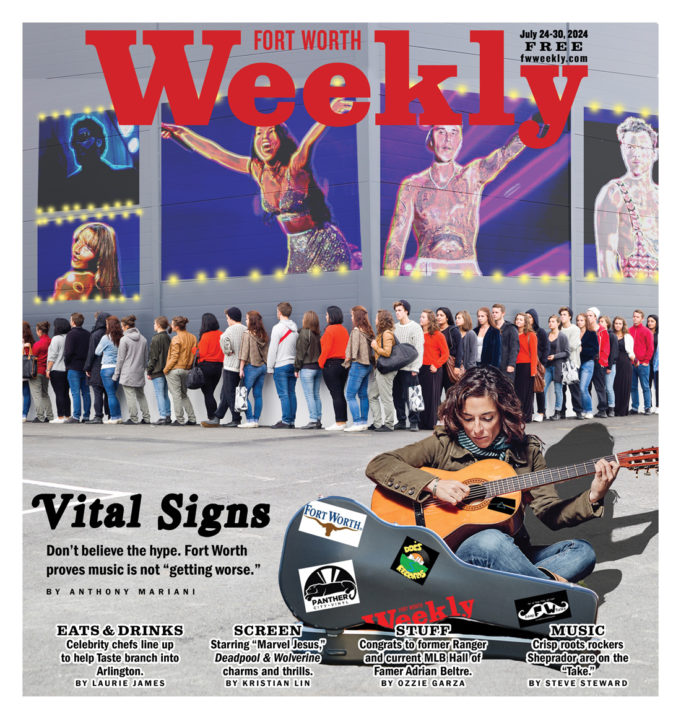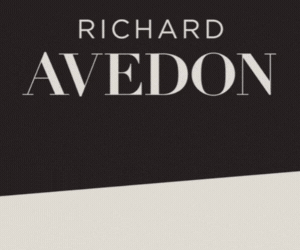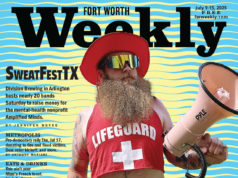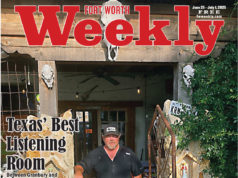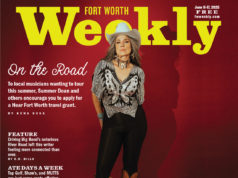Non-classical, non-jazz music — or pop — is too easy to make, and non-classical, non-jazz music is also too easy to consume.
This is why music keeps “getting worse,” according to Rick Beato. The veteran multi-instrumentalist, producer, and educator with 4.33 million subscribers on YouTube recently posted a two-part, or “two-act,” 12:42-minute vlog in which he claims pop music continues failing us like so many Texas energy providers. And when Rick busts out the kitchen faucet to illustrate his 0.002 cents on streaming, you know he means business.
And the business he means flows mightily. A new RIAA report says that the music industry creates $170 billion in annual value to the U.S. GDP while supporting 2.47 million jobs and generating $9.08 billion in export sales. In Fort Worth, a 2023 look commissioned by the visitors’ bureau found that our music “ecosystem” produced and maintained 6,018 jobs, representing a total output value of $531 million and a total Gross Value Added (GVA) of $333.3 million. The report adds that live music is our greatest strength. Our greatest weakness is our meager support, financial and otherwise, for musicians.
Indie-rock Fort Worth singer-songwriter Denver Williams recalls that during his time in Austin, “there was a foundation that provided mental health care for musicians. That doesn’t only improve the life of the receiving person. It ripples out into the world. It changes everything. And that’s not just for artists. Everyone should get dental and mental health care, but many artists are self-employed, and that stuff is hard to come by.”
Our neglect can be attributed to a few factors, notably and quite possibly one we see in the mirror every day. As attendance to mega-concerts broke records the past two years, dozens of independent venues across the country, including a few here, closed, proving that a lot of us still have the appetite for live music — but only if it’s cozy and/or every note has been tattooed on our gray matter.
We love to witness our security-blanket songs performed onstage as much as we love to own or stream them. Seventy percent of the music market in the United States is old music, and old music consistently outsells new tuneage by a wide margin.
“We are in a moment of nostalgia culture, which makes it extremely hard to have monetary success as an independent band,” said Mandy Hand from Fort Worth pop-rockers Big Heaven. “That can be seen even in feature movies and television shows, which use 40-year-old pop hits rather than new music, all the way down to the free outdoor events in the suburbs that hire tribute acts. Time was that Fort Worth could hold a free outdoor event and feature live independent music. I hope we can get back to that.”
The phenomenon of looking back tenderly undoubtedly affects how the powers-that-be view new artists and songs. Taking a chance on an unproven talent requires a species of willpower that Sony, Universal, and Warner would likely rather apply to transforming young, unschooled listeners into new fans of this still lucrative, can’t-kill-it old music. Those Black kids on YouTube deliriously freaking out over hearing Led Zeppelin or Van Halen for the first time probably have no idea they’re just gratifying The Man. I can’t say I blame them. Baby Boomer Bullshit, as one of my jagoff friends nastily calls classic rock like Led Zep and VH, represents some of the greatest music ever written, and as Triple-B lover Rick Beato argues, new mainstream music isn’t exactly helping itself.
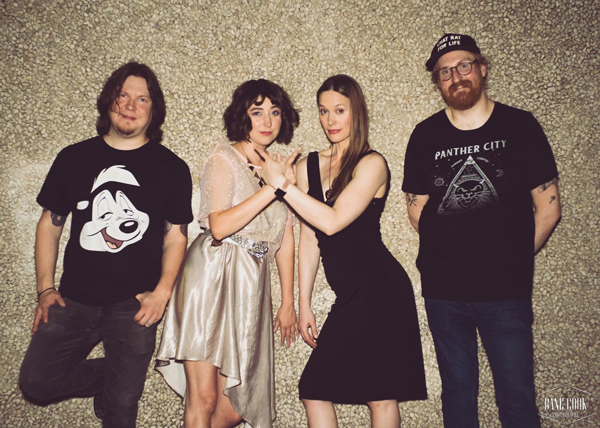
Photo by Bane Joseph Cook
*****
I had just watched Ricky B. go off on the blandness and homogenization of contemporary songcraft as I hit “play” on my Rush playlist, grudgingly. My son revolted. “Please, not them again, Dad.”
It was a random weeknight, and my 12-year-old and I were hanging out in the main bedroom like we normally do before my family and I make dinner. We were essentially killing time before reheating our leftover chicken-fajita tacos, with homemade tortillas courtesy of A. — he’s probably the only cat I know who can throw three TDs and no picks at flag football in the morning, then come home and whip up macarons and sourdough bread at lunchtime. As I was tactfully avoiding work by reclining on the IKEA chaise and texting friends, A. lay on the bed with his iPad doing the usual. Chatting with his school buddies or kvetching over Project 2025 (no joke). And like every other hang session, we were about to endure another one of my same-ol’ same-olds when he spoke up. Rush had soundtracked our past few chillouts. My favorite childhood band serves as a soft, warm, comforting, occasionally screechy balm when life gets crazy and I can’t shake the inevitable decline of Western civilization and the irreversible death of the planet. To me, not hitting “play” felt right. More than right.
“You know,” I said, “I’m actually pretty tired of Rush, too.”
A. scuttled over to me. “You need some new-school hip-hop!”
I groaned. I’d heard my son’s “new-school hip-hop” accidentally before. BigXthaPlug, Polo G, BossMan DLow — they’re all repetitive, chintzy, bleeped out, and dreadfully same-y, and a lot of these dudes don’t even bother to rhyme. They just kind of yell-talk at you.
What came out of A.’s iPad now wasn’t that.
What came out of my son’s device was … not half bad.
To a fluttering, melancholy flute figure and an unfussy trap beat, a man’s voice mumbled, “Percocet / I’m outta Percocet / Percocet / I’m outta Percocet / Represent / Gotta represent / Chasing chick / Never chase a [bleep] / Mask on / [Bleep] it, mask off.”
I looked at A. He looked at me. I smiled. “Who is this?”
A. launched himself to his feet. My knees creaking, I slowly pocketed my stupid phone and even more slowly joined him in the middle of the room. And we danced. And like all million-and-one of our previous get-downs, I rehashed my same three go-to moves from high school (a lazy Cabbage Patch, the NKOTB legs thing, and the Running/Lightly Jogging Man) as my cool not-so-little guy went bonkers, his 5-foot-6 wacky inflatable tube man’s body getting high and getting low, his sinewy limbs roving all around like he’s trying to swat flies away from everybody’s full plates while playing soccer with 20 balls. I can always just die happy here with him, me and my boy grooving.
Big stepping to the gloomy, psychedelic vibe, I had to grab A.’s attention again. “Bro, who’s singing?”
My son glanced at his iPad. “It just says ‘Future.’ ”
I’d heard the name before — probably via some magazine or blog, or an ad — but never his music. His aggressively detached delivery toying with the beat beneath the ethereal woodwind took me someplace else, maybe to a big city at night, seated alone in the dark in some high-rise apartment, breathing in the twinkling lights outside, the concrete towers guarding me. I loved it. It almost made me tear up. And vomit.
A terrible thought wrenched me: Is there other great music out there that people like me are missing because we’re too heavily depressed and hobbled by politics, the climate, work, parenthood, and pineapple on pizza to hear it?
And there was more, worse: Would most of us even have the bandwidth to enjoy any new music if we came across it? Either through our earphones or in person? If aliens beamed me down into the middle of a blistering set by a local indie-rock band at its peak at The Cicada, the Boiled Owl Tavern, Tulips FTW, or any other independent venue in town, would I be able to delight in the sounds and sights without worrying about all the stuff that normally spleens me like politics, the climate, and all the rest of that noise?
Rick Beato doesn’t talk about our deteriorating bandwidths or life’s general suckiness when each phenomenon deserves its own feature-length documentary. They’re two huge reasons why most of us aren’t consuming music the way we may have in the past. As the meme goes: If you’re not worried, you’re not paying attention. All of my favorite genres, all of my snuggly ol’ blankies — Baby Boomer Bullshit, old-school hip-hop, grunge, straight-ahead, musicals, and MTV bubblegum, just to start — have been turned to stale bread by this overarching fear. Folks like me need a way forward. Just clicking “play” on that precisely 200-song-long Baby Boomer Bullshit playlist, stocking up on ammo, bottled water, canned peaches, and tuna, and hunkering down seems cowardly.
The answer is in Whitney: “The children are our future.”
*****
Rick Beato’s two reasons why “… Music Is Getting Worse” come from a breezy, decidedly not-unwelcome anti-Man stance.
The ease with which a large chunk of non-classical, non-jazz music is concocted these days means that anyone — even 12-year-olds like A. (rap name: Ice Cold) — can, through computerized legerdemain, produce passable versions of traditional songs. This filler clogs the market, effectively burying “real” tunes.
Reason 2: Music being too easy to consume equals listeners ending up accepting some or more of this filler. More accurately, we popularize a lot of it because it’s served up by charismatic figures dressed in visual or biographical finery. Accepting or embracing filler only leads to more of it, an ouroboros starving to death or an infinity loop of dung.
The science backs Rick up. Studies say new music’s blandness and homogeneity owe to a lack of “harmonic complexity” and “timbral diversity.” Technology (surprise) is mostly to blame. Social platforms like TikTok have forced the average ambitious artist to think shorter, louder, blander. Tunes must be snappy and easily digestible, and loud, with no hooks — strong melodies may interfere with our good times blasting bad guys onscreen or studying, painting, working out, folding laundry, whatever. The catchiness, it burns! Science also says the lyrics to most mainstream songs are so repetitive and generic, the average listener whose gray matter has not yet turned to beef jerky cannot form any lasting bond with them.
Pop still dominates the market thanks to one factor: kids. Like me when I was growing up, with my untied Reebok high-tops (one black, one white) and my Powerslave concert T, Ice Cold and his contemporaries gravitate toward broad strokes: loudness, repetition, sheen. And as long as we keep hatching tweens and teens, whose undeveloped palates can’t discern New Kids on the Block from Johann Sebastian Bach, crappy or undercooked music will continue to flourish. It’s been this way forever.
It definitely was this way back when Rick Beato was young. In “… Music Is Getting Worse,” he cleverly compares the average price for a streaming subscription with how much an album cost in his Baby Boomer Bullshit era. They’re about the same. The difference is that one affords you only several songs by the same artist while the other offers you almost the entire history of recorded music anytime you want it, and this, Rick feels, cheapens the overall listening experience. I can’t honestly disagree. Buying a lone LP all those years ago was magical. With the spare change I earned busing tables at Lombardozzi’s, I was able to snag about one used record every two weeks. Sometimes I’d take home a platter based only on the cover art and (familiar) name. Whatever it was, it was an investment, and as an investment, it demanded I seek dividends from it. With my headphones coiling into the sleek, silver Panasonic family hi-fi, I lay on my NFL-logo-sheets-covered bed listening carefully while following along with the lyrics and/or reading the liner notes, every word, even if the tracks left me wanting. I only recently realized this was as good as consuming music was going to get for me.
“I’m old enough to remember when people would line up at record stores to be the first to snag a midnight release of a new album or camp out at a ticket office to be first in line to get concert tickets,” said Mikey Frenchtoast from the 817 Riot Grrrl band Ex-Regrets. “Music was important enough to do that. Now, it’s become a disposable commodity, and, to me, it feels like it’s only important to other musicians and a few of our friends.”
In the paraphrased and locally famous words of beloved rootsy Fort Worth singer-songwriter Carey Wolff: Now, it’s just broke people giving other broke people money.
I still had to bring some of that old-school vinyl romance to my daily listening life. There’s something weird and desperately sad about folding laundry to “Shine on You Crazy Diamond,” “The End,” “Supper’s Ready,” “La Vie en Rose,” “Acknowledgement,” “Atlantic City,” “Feeling Good,” “A Day in the Life,” Ralph Vaughan Williams, “Secret Touch,” “Deacon Blues,” “Heading Out to the Highway” (so what?), and all the dozens of other unqualified masterworks dear to me. They demand my complete reverence and undivided attention, and that’s what I give them by skipping them for later, optimally when I’m alone and can drink in every note (and some strong Earl Grey) in peace.
I’m not saying Rick is categorizing non-major-label material as filler outright. He’s just showing that he hasn’t dug deeply enough into the market. If he had, he would have realized that major labels tell only half the story. The other, better half swells with progressive, novel sounds — it’s what the mainstream is influenced by. I know this because what I hear coming out of Fort Worth is just as progressive and novel as what commercial radio and our screens try to sell us nonstop.
Yes, most of Rick Beato’s thesis goes down smooth. You may even find yourself occasionally at the mercy of your inner caveman, tottering with a cudgel poised over your pedal board or laptop and grunting, “Ooog, technology bad!” My chief complaint with the vlog is that in all his handwringing, Beato (perhaps willfully) ignores an entire, massive segment of easily the most culturally pervasive artform on the planet. And this missing ingredient is what local scenes like Fort Worth’s have subsisted on and produced for decades.
I don’t blame him. Rick is simply a product of The Man. In all the rags — and podcasts and subreddits and YouTube videos — even passingly interested in pop music, most of them focus only on mainstream output, the stuff spoonfed to us by multibillion-dollar conglomerations via nearly every radio format; nearly every mainstream magazine, newspaper, and podcast; and via nearly every incidental platform (movies, TV shows, commercials, bars/restaurants/clubs). To Rick Beato and his counterparts at Rolling Stone, The New Yorker, The A.V. Club, The New York Times, NME, and elsewhere, independent or underground music barely registers, which is not just a tiny oversight. Globally in 2020, indie artists released more than 9.5 million tracks, eight times major-label artists’ 1.1 million. In the Financial Times, a former Spotify chief economist wrote that everyone should “be watching this industry as a living demonstration of what happens when barriers to entry fall. The pie definitely grows, but the number of creators wanting a piece of it grows even faster.”
In terms of labels, the largest piece of said pie belongs to the indies at 35.74%, or more than a third of the entire delicious circle. That’s a wealth of records that may never go beyond their local communities but that are still important and worth analyzing in clickbaity vlogs to millions of viewers.
In “… Music Is Getting Worse,” Rick Beato might have been better off simply saying, “Baby Boomer Bullshit-influenced music is dying out,” to which I would have replied with, first, “Welcome to 2001,” and, second, “You should probably get out more.”
“… Music Is Getting Worse” came to me in a text thread I share with two buds back home, and I put off replying to Jeff and JC until I had watched the video enough times to start muttering to myself like Aqualung. As Rick’s tale unfolded, the gray-pompadoured, clean-shaven, small-chinned bro getting nostalgic about saving grunt-work pennies to buy vinyl when he was a kid (I feel ya, paisan), I thought a few times about how much different our worlds are, mine and Rick’s and also mine and Jeff and JC’s. Here in Fort Worth, the independent, underground music scene still cooks — there’s almost as much stellar rock, hip-hop, pop, and Americana now as there was 20 years ago when I first landed in town. Up where Jeff and JC live and where the three of us grew up, Pittsburgh, there’s never been much of a local scene at all. Our hamlet’s two greatest pop exports are a short-lived MTV pet (Donnie “Love Is Like a Rock” Iris) and a fantastic math-rock outfit no one below the Mason-Dixon Line has likely ever heard of (Don Caballero). My guess is that Sixburgh, baby, is not alone in this aridity. That still doesn’t mean local, independent, underground musics do not matter or are somehow lesser. They’re there. We may just all be too beaten down by harsh, unforgiving reality to seek them out or support them. Rick et al. ignore them for one obvious reason. As with politics, all-important access to cultural shapers comes at a price.
*****
The key for us may be to think — and feel — younger. Cue: Whitney. Which could be as easy as popping into a new venue on a weekend with a wad of dirty Hamiltons in our back pockets or letting our 12-year-olds choose our pre-dinner-hangs music.
As A. and I moved our bodies semi-rhythmically in the main bedroom, my sweet son once again expressed how much he really wants to go to “a rock show,” a bona fide concert, when last I’d checked, the only interesting acts coming to North Texas are Baby Boomer Bullshit artists. As much as I adore Santana, the Counting Crows, Deep Purple, and Yes (all Dickies), and Weezer (AAC), and The Roots and Jane’s Addiction (both Toyota), and Journey with Def Leppard and Steve Miller (Globe Life), and as wonderful as I think they’d all make for a first live throwdown for my boy, I just can’t swing it right now. I’m too stressed for the traffic and crowds, too cranky and broke for the prices, and just too un-young for all of it. I’m also maybe too woke? Seeing Future coming to the AAC in late August, I Googled him. Brah, it seems, is a womanizer and a deadbeat. Pass. I’d much rather save the 100 bucks I’d have spent on two Future concert tickets and apply that to my kid’s flour, butter, and baking powder budget.
Anyway, I bet A.’d be better off at a much less populated show, like at The Cicada, the Owl, Magnolia Motor Lounge, Tulips, or some other local spot — if he didn’t start getting drowsy at 10 p.m. sharp. I don’t even know if we’d be able to catch anything other than soundcheck before my son’s eyelids would begin to droop. (Thank you, Friday on the Green, for always starting at a god-fearing hour.) I’m also not sure his sensory-divergent self would be OK when smacked with the loudness attendant to a real rock concert, at a local venue or an arena.
The box office shows that millions of us don’t have that problem. The clamor for Taylor Swift, Metallica, Madonna, U2, Kenny Chesney, Coldplay, the Eagles, Nicki Minaj, and all the other arena- and stadium-filling acts who rolled across the globe the past two years has not gone away, and as we keep snatching up big-ticket tickets, we shamelessly scoot right past all our independent venues. The booking/managing platform Amptup says these repositories for sometimes catchy, sometimes dissonant sounds might be ultimately doomed by “a lack of standards around booking performances, high rent loads for venues, and fan lifestyle evolutions,” namely the “Netflix effect,” a sour mélange of “people now accustomed to staying on the couch, the shift to work from home, and budget constraints.”
Despite the loss of Lola’s, The Post, and Twilite Lounge, a handful of local addresses friendly to independent, underground, original music persists. Some are even percolating.
*****
Since opening in March 2023, The Cicada has been doing “pretty well,” said John Stevens, who co-owns the Near Southside venue with wife Tyler Stevens. “Obviously, some weeks are better than others, depending on the bookings, but [it’s] growing more and more steady.”
With an SRO capacity of 150, The Cicada hosts live music three to five times a week. Success, John said, “is a relative term. Of course, like any other bar/venue, our success has to be measured in sales. Without revenue, we can’t keep the lights on and the doors open. Pretty simple. However, in terms of being able to provide a great place for musicians and artists to come play and create, building a clientele that loves to come enjoy great music and art, and building what we hope to be a home away from home for everyone in our community, I think we’ve had amazing success in our short time being open. Growing each day!”
The Boiled Owl always hosted occasional shows but brought in more right after the pandemic as a way to keep live, local, original music going, said owner Autumn Brackeen. Putting on two to four gigs a month, she said, has been “going really well. … With us being selective, we’re showcasing bands we really love.”
Taking a gander at the crowd is one way Brackeen measures success, “how many people are coming to see the band,” but “obviously, our sales are the way we measure it as well, and since we don’t charge a cover, usually sales are much better on our live music nights.”
Because the Magnolia Avenue-located Boiled Owl is a community tavern, Brackeen doesn’t want to run off her regulars with cover charges or too many shows, and Jon Carney feels similarly about his spot right down the street, the Chat Room Pub. You’ll never pay a cover at a Chat Room show.
“We’re kind of at a point where we’re not a live venue — that is crystal clear — but a lot of people like playing here,” he said, “and I’m going in this direction. A lot of my friends’ bands love playing here, and — again, clearly — it’s a built-in crowd.”
In Fort Worth, indie-rock and country/Americana artists have a few homes. Based on some stories I’ve heard/read, it’s rap, punk, and metal that need help. While Haltom Theater does a splendid job with Pantera-influenced, devil-horns-up rock and Growl Records regularly showcases punk, neither locale sits within Fort Worth city limits — with the Haltom in Haltom City and Growl in Arlington. And, troublingly, there really hasn’t been any outlet for rap since Lola’s closed. Since the genre is the most streamed (nearly 10.5 billion-with-a-“b” tracks) and Fort Worth is the 12th largest city in the country, it’s bizarre that of the U.S. Census Bureau’s Top 25 cities in size, we may be the only one without a legit, steady place for rap/R&B/hip-hop.
Hand, recalling Big Heaven’s first time back onstage post-lockdown, at Growl, said, “It was a good show, but the scene definitely felt different. Gutted. The shutdown changed a lot of people’s habits forever.”
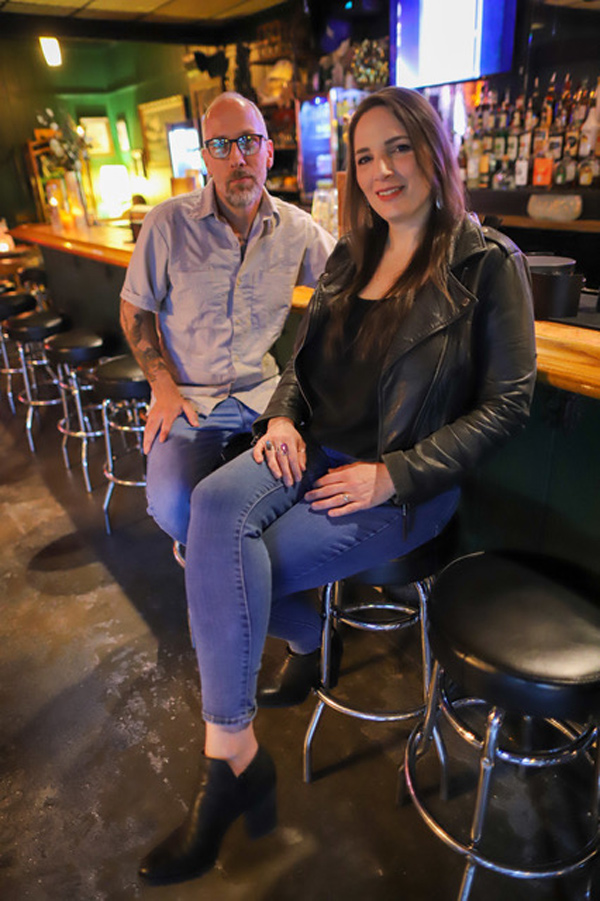
Photo by Juan R. Govea
*****
The Cicada, the Owl, and sometimes the Chat, plus MML, Tulips, the Ridglea Theater, Tannahill’s, and a couple other indie-friendly spots now benefit from the vast number of Fort Worth artists like Big Heaven, Denver Williams, and Ex-Regrets who either woodshedded during the lockdown to develop new songs or lineups or who ramped up writing and gigging after masks became optional. Royal Sons, Summer Dean, Henry the Archer, Cut Throat Finches, Hotel Satellite, Claire Hinkle, Arenda Light, Averi Burk, Spring Palace, Cory Cross, and quite a few others continue writing and performing regularly. With the days of humping it to earn a big, fat label deal long gone, success assumes different shapes for different artists.
“We would all like to make a lot of money and be famous rockstars, right?” Ex-Regrets’ Frenchtoast said. “At least that’s what 20-year-old me thought when I started taking writing and playing music seriously, but now that we are all in our late 30s and early 40s, just being able to continue writing songs, recording and releasing those songs, and being able to play shows is satisfying enough. We play our music because we have to, and if it ends up costing us money to do it, then so be it.”
Indie-rocker Williams also keeps grinding out of pure love for the craft.
“Every year or so for the last two decades,” he said, “I’ve had to shed the skin of what I previously thought success was. In the present, I feel successful. Every creative moment is a success. Being alive is a success. I think increasing capacity for acceptance and gratitude would be a reasonable goal for me — man, to stop wanting what they’re selling and to be of service in a manner compatible with my own rhythm. That sounds like what I want.”
Big Heaven’s Stephanie Benjamin sees the concept of community playing a large part of whatever success may mean to her and her bandmates.
“I gauge success by high turnout, new faces, and those moments you look out into the crowd and you see others singing along to the songs you’ve written,” she said. “Success is also collaborative work with other bands, such as [Fort Worth label] Dreamy Life’s Group Therapy albums. And, honestly, I hate to say it, but we all know it’s true: Success would be so much sweeter if venues paid bands better.”
Money and “fame” have never been the point, Frenchtoast added. “My advice to other independent artists is to do it because you love it. Even if you are putting out songs that a few people listen to or you play shows that a few people attend, still keep doing it anyway because it fulfills something within you. Make friends with other bands and support the small venues in your area. Being a part of that community is special, and the memories will last longer than any money or fame ever will.”
As an oldice who escaped his Rust Belt backwater two decades ago, I now have friends/fellow escapees across the country, and when I rave about Fort Worth’s music scene to them, past and present, they look at me as if I said everyone in Texas builds their own furniture and butchers their own meat. My out-of-town pals, their eyebrows raised, not so subtly say, Why would anyone bother making music outside their bedroom or friend-filled patio when you can just listen to Led Zeppelin IV for the 9 millionth time?
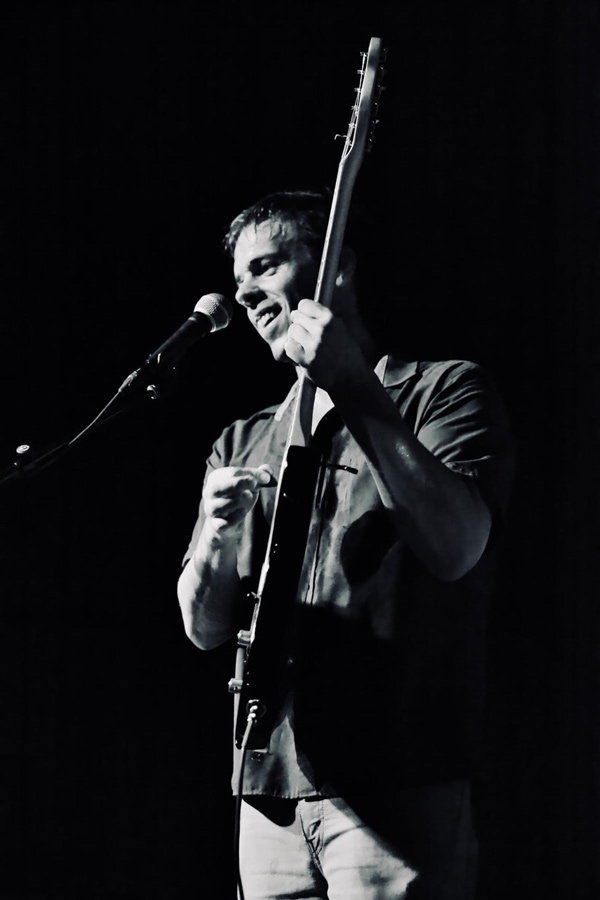
Photo courtesy of Bandstalker Fort Worth
*****
As “worse” as mainstream music is allegedly getting, we’re probably as much to blame for its terribleness as quantized beats and Auto-Tune. If money talks, then we’re saying — screaming — that we want more “old” music, and I can easily see why. With democracy about to die, the planet on fire, a new mass shooting every week, and scores of other terrors, life is frightening. The familiar, the known, the loved — these qualities steel the bond between us and the songs (or films or writings or paintings) that soothe our beleaguered souls best. We also may be so resistant to new music because opening ourselves to never-heard-before sounds requires patience and non-passive engagement, and our bandwidths are simply tapped, our patience gone. Everyone’s burned out.
Roughly one in three U.S. parents say parenting is stressful “most of the time,” according to a 2023 report by the Pew Research Center, and in another 2023 report by another agency, nearly 60% of 722 working parents surveyed feel they suffer from “parental burnout.”
Work is also crushing us, all of us, not just parents. One report says that about 82% of U.S. employees are at risk of burnout this year and that “only half of employers design work with well-being in mind.”
Gen Zs and millennials may be the worst off. Not only are they working more and earning less than every previous generation, but they also came of age during times of unprecedented collective trauma (9/11, mass/school shootings, social media). So much incremental stress, anxiety, and possibly real psychological or physical damage make straying from the known and familiar — from the songs we don’t skip to the people we text back immediately — a major undertaking.
And when Zs and millennials look back for comfort, it’s not to music (or cinema or literature or visual art). They go to video games. A 2022 study says that more than half of Zs feel gaming just makes them feel better.
“I game for nostalgia,” one young woman told The Guardian, adding that it “eases my mind and lets me escape into a different world. [It’s] an excellent stress- and anxiety-reliever.”
Video games: also not going to local shows.
*****
Wrapping up our mini-disco, A. and I hugged out our mutual yet charming embarrassment and hit the kitchen for them-there tacos.
Busting moves with him to Future and a couple other mumblecore rappers was the best I’d felt about music in a long time, and it wasn’t even the beats and melodies themselves that I was particularly jazzed about. It was the cosmic community the trippy sounds engendered between my son and me. I couldn’t deny it. The vibe turbocharged my brain.
Inspired, on my long drive back from the office the next day, I clicked No. 2 on my preset dial. Once my favorite local outlet for new, progressive, mostly non-major-label music, KXT hasn’t touched my ears in years, not surprisingly since around the time of the pandemic, when my bandwidth and patience began to fray into the scuffed, knotted bundle of strings it is now. Aside from some Baby Boomer Bullshit, this KXT experience teased out a smile on my heart. Nothing wowed me into Shazaming it, but I didn’t feel attacked by anything, either.
Small steps. And I’ll keep stepping — right into the Ridglea Theater on Friday for a show by Heretic Klick, an ICP-ish rap duo (facepaint and all) from Arlington by way of *checks notes* Lubbock. My goal is twofold. 1.) I want to experience live music outside what I normally dig — to rattle my comfort zone a little and to support the entire scene, not just my favored (indie-rocking) retreats. And 2.) I’d also like to rebuild some of my bandwidth. And that’s not going to happen if I keep lounging at home, doomscrolling, rattling my fist at clouds, and whining, crying, and writing whiny columns like this. I don’t anticipate joining Juggalo Nation Friday, but just to be sure, I’m eyeing that Hotel Satellite/Cut Throat Finches gig at the Chat the following night. Downbeat is at the oldice-friendly hour of 7 p.m. Hey, ho, let’s go.
Now’s the time to take those non-giant steps. Seeing live, independent, underground music, especially if it’s outside your favorite genres or locales, and purchasing new or new-to-you music (hopefully also local) inveighs against the night, against the death of democracy and the planet, against your more simplistic, less brave, and, I’m going to say it, most boring self. By breaking out of our fetal positions at the foot of the couch, the glow of the Netflix logo from the TV nearby bleeding red across our tear-strewn faces, we will declare, “You shall not pass!” to the gloom. Burnout, schmurnout. Go grab that ring.
One part of combating the universal malaise, shifting perspective targets the root cause: ourselves. Taking inventory of our mindsets and assumptions may allow us to distinguish between the changeable aspects of our lives and the truly fixed ones. Two things I know I can switch up are my environment and my routine, which is why I’ll see you all at the Ridglea Friday for some sweet, sweet Lubbock Juggalo action.
At the same time, I’ll also be effectuating another burnout countermeasure. For an hour or so, I’ll be able to reduce my exposure to stressors by burying my doomscroll device in my back pocket. Along with eating healthy (mostly), sleeping well (sure), and exercising (meh), keeping my phone a safe distance from my face, even if only temporarily, will constitute the best self-care I can think of right now. I can already feel my bandwidth and patience growing just thinking about it. And the Ridglea. What a cool, unconventional conventional place. We should all check it out more often.
One guy who could use a trip or five to his local castlelike indie venue is Rick Beato. In a user comment on “… Music Is Getting Worse,” @lefty7744 says, “There’s still good music being made. You’re just not looking past the Top 10 billboards and think that this is representative of all the music made nowadays.”
@zsoltbartus169 also has thoughts. Music is not getting worse, they say. Rick is “just looking for it in the wrong place.”
Chewing on “… Music Is Getting Worse,” I can’t help imagining Rick strapped to a highchair whining about the creamed peas being jammed down his throat when he could simply just unsnap himself, drive to the supermarket, buy a T-bone, and slap it on the grill out back. Ex-Regrets’ Frenchtoast implicitly agrees with the commenters. “Music, in general, has not changed. There are still a lot of great local bands all over the world, and with the internet, it’s as easy as ever to find [them] if you know where to look.”
Surf the streaming services. Pick up the local alt-weeklies. Tune into college radio (KXT and KTCU here — our once beloved KNTU is all crotch-rock now). Ask clever friends for recommendations. Put down the TV remote, use those creaky joints to stand up from the couch, and start heading out to the highway. Or the streets, for you urban dwellers.
“There are a lot of younger acts that are really doing the work to get out of town and get seen,” said Big Heaven’s Hand. “It would be cool if the younger bands and the longer-running local bands had more contact and acquaintance with each other. I’m thinking specifically of what [Fort Worth production company] TRND MUSIC is doing. As much as possible I go to those shows … to support and get to know them.”
Hand also says she enjoys events by Hear Fort Worth and Amplify 817, two government-adjacent programs, plus the Near Southside’s live series Lost ’N Sound. “I think the Fort Worth scene is small enough that all of these players should collaborate more.”
Maybe Rick’s car is in the shop. Maybe his Wi-Fi is iffy. Or maybe Rick Beato is so ensconced in his national-media bubble, he’s forgotten about the independent underground. Like every other cultural tastemaker, he probably sees only what he wants to see, and I say this with all respect: All national media exchange coverage for access, and all well-moneyed companies eagerly play along.
Exceptional artists are out there, Rick — and Jeff and JC. You’ve just got to unstrap yourself from the highchair first.
Update: A previous version of this story included an error about Dreamy Life Records which has been fixed. We are sorry and apologize for any confusion.



